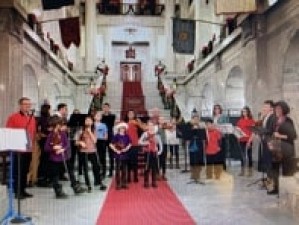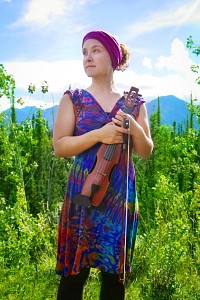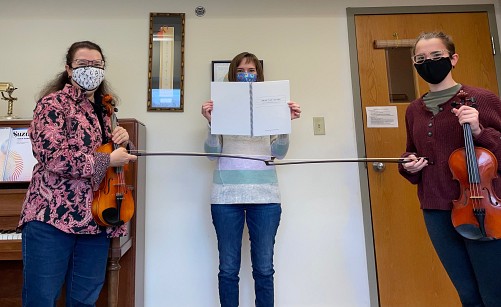 |
||||
The SAO Celebrates a Weekend of Firstsby Karen-Michele Kimmett, (ON) This past November, Canada’s only Chapter Affiliate, the SAO (Suzuki Association of Ontario) hosted its first ever virtual Conference. Clinicians Mark Mutter, Myra Leung, Carmen Evans, Sally Gross and Nicole Wilton offered successful Saturday classes to 137 students hailing from all over the province of Ontario. Sunday’s Keynote speaker, Martin Rüttimann, from Basel, Switzerland presented inspiring and thoughtful insights in his talk entitled: “Suzuki in a Changing Environment.” Martin, the first European to give the Key Note to a SAO Conference, included moving testimonials from Dr Suzuki’s discussion with William Starr, several humorous reflections of his own childhood as a not-so-easy Suzuki student, as well as what he has learned in his many roles including former Chair of the ESA and ISA. Martin wove many Suzuki concepts into his eye-catching screen presentation, challenging the viewers to re-think each one. Heraclitus wrote: “you can never step into the same river twice” so how do we Suzuki teachers distinguish the concepts of “repeat” and “review”? Kudos to the Conference team: Debbie Hammond, Geneviève Schirm-Joyce, Rebecca Ashworth for organizing a stimulating November 2021 Conference. Sincere thanks also to the rest of the Board of SAO, who this past year worked diligently to update the organizational and governance structure of the SAO to better reflect our current provincial laws. Ontario includes a vibrant community of Suzuki teachers. Martin suggested each of us acknowledge our own strengths and weaknesses as teachers while doing the same for all our colleagues. Striving to better appreciate the many strengths of each colleague will benefit our entire Suzuki community in Ontario.  Vibrant Viola Venturesby Cherie Larson, (AB) Why do you always bury a viola player three feet under? Violists are very nice people above ground too, honestly! Being very nice people, we wanted to create an opportunity for our viola students to be further enriched in their musical journey. Voilà! Viola! has been an opportunity for violists from many studios, along with alumni and community violists, to perform at the Alberta Legislature each Christmas since 2010. As we emerged from the loneliest days of COVID lockdowns and restrictions, a desire for connection with other teachers arose after so many months teaching alone. Thus, a new extension of the Voilà! Viola! gatherings was created. Vibrant Viola Ventures is a monthly gathering of violists from 8 different Suzuki studios from across the city of Edmonton. Vibrant Viola allows viola students to experience the joy of the viola by joining our unique sound in large groups. Many upper string teachers have several violin students and only a handful of viola students in their private Suzuki studio. Most of the students still participate in their own teacher’s studio group lessons consisting mostly of violinists. The opportunity to perform together as a group of violists creates a sense of community among the young violists. In December, we are scheduled to perform at the GLOW festival and at one “open” seniors’ residence. Each month features a different instructor. We believe that the exposure to a variety of Suzuki teachers gives students a unique opportunity to learn through different approaches and styles. The Suzuki viola teachers have met virtually to plan out the schedule and calendar, COVID protocols and QR codes, to determine the group class lists, venue, payment set-up and registration, repertoire in groups, and for performances.  The September group was held outside and then a location was found for subsequent once-a-month Saturday morning groups. We feel as viola teachers that it is extremely important that viola players are able to explore and celebrate the unique sounds of our instrument together as a group. For now, we have 3 groups: Early-mid Book 1, Bach to Boccherini Minuet group, and a Book 3 and up group. We have been averaging around 25 violas each time. Even though we are still dealing with limited numbers, distancing, masks, and QR codes, we are thrilled to be providing these viola groups for our students. It is our hope that Vibrant Viola will become a valued place for us all to form and strengthen our connections through our beautiful instrument: the viola! (The viola students come from the following 8 Suzuki studios in Edmonton: Charlene Bentum, Bonnie Gregory, Cherie Larson, Leanne Maitland, David Mitchell, Rod Olstad, Adam Pappas, and Thomas Schoen)  Love Unlimitedby Katie Avery, (YT) The summer before COVID I went to a non-Suzuki classical music camp for the first time in my life. While it was nice to be surrounded by lots of professionals and eager amateurs, it was also a sad reminder of some toxic attitudes of the classical music community. Living in the Yukon, I am separated from things most of you may take for granted. For example, there is no professional symphony anywhere near here. This separation also means I am not subject to another thing I did not know I took for granted until it was gone: The idea that it is important to hate yourself in order to be successful in this field. This value of self-loathing is so pervasive that you may never have noticed it consciously. I certainly did not until I lived without it for nearly a decade. Then I went to this camp, and a young colleague told me a story. He spoke of a young woman he had known at university who he deemed to be “talented.” She was deeply unhappy, always claiming she was not good enough, and she dropped out shortly after winning a concerto competition. Then he said something I am sure we can all relate to: If I were that good, I would be happy. Clearly, this young man was not happy, and he blamed it on “not being good enough.” However, he is so good! Does he have more to learn? Of course! Is that not why we chose Suzuki, to embark on lifelong learning? Dr. Suzuki asked us to nurture love. How can we nurture love in others if we cannot nurture it in ourselves? My own Suzuki teacher never told me that I should hate myself. Of course not! But I still learned that lesson because this lesson does not come from the mouths of others. It comes from a constant seeking of a perfection that does not exist. To strive for something impossible can be a slippery slope of negative self-talk which I can say from personal experience can lead to a spiral of depression that is difficult to climb out of. A quick google search will bring up many studies showing that artists of all kinds are more than twice as likely as “the regular population” to battle symptoms of depression. So let me offer some thoughts to those of you who may be struggling right now. Maybe you ARE good enough. Maybe our quest of life-long learning is about always seeking deeper connection, rather than seeking perfection. Playing music is magic. Some of my most treasured memories involve singing songs crammed into a kitchen with a bunch of very ordinary people who I happen to love deeply, or performing in an orchestra with a particularly inspiring and joyful conductor, rather than a draconian one. I hope you can be that inspiration, and that love for yourself. When we start by loving ourselves, there is no limit to the love we can have for others. Demystifying Teaching Improvisationby Laura Nerenberg (ON) I’ve been teaching improvisation since the mid 2000s. I’ve had the chance to work with students from across North America and Europe, and even India. During that time, I’ve observed some startling myths when it comes to teaching improvisation. Here are the three most insidious myths: Myth 1: Improvisation is only for truly creative people The idea that Every Child Can lies at the core of who we are as Suzuki teachers. Which is why I feel sad when I hear someone describe themselves as uncreative and unable to improvise. Regardless of a person’s natural creative tendencies, creativity is accessible to everyone. It’s a fact that many professional classical musicians have survived traumatic early experiences with improvisation. I am among the traumatized. I was led to believe, by teachers who yelled at me when I was timid, or gave me unhelpful assignments, that I would never improvise. Thankfully, I met more helpful teachers. Eventually, I started believing in myself as a creative musician. Some may be more naturally creative than others, but it doesn’t mean creativity is reserved only for them. In fact, everyone’s brain needs regular doses of creativity. Myth 2: Improvisation is just for fun You’re listening at the door of one of my improvisation classes… You hear music followed by… LAUGHTER? It’s true, many of the improvisation games I teach cause giggling. Giggling together releases oxytocin in my students – a feel-good hormone that enhances bonding and trust. Sure, it can seem like we are just goofing around, not getting any real work done. But nothing could be further from the truth! Every exercise I teach has one or more pedagogical goals among the following: 1. Melody or soloing When you hear my students laugh, you’ll know they’re having fun and learning musical skills simultaneously. Myth 3: Only seasoned improvisers can teach improvisation So few classically-trained teachers teach improvisation. It is only natural to teach what you know! Since so few of us learned to improvise as students, it makes sense that so few of us teach it. In fact, even after I’d started improvising publicly, I still didn’t teach it. I just had no idea what to do! When I did try, I taught too much theory first, which made my students feel less capable of creativity, not more. It was a total failure, so I got some training and I gained the tools to teach improvisation.  Most teachers I work with are new to improvising and learn alongside their students. This seems anathema to how we see each other as skilled teachers. But as improvisation teachers, we are the catalysts of our students’ creativity. We don’t instruct; we facilitate. Improvisation training satisfies a need not met elsewhere. If you’d like to learn more about teaching improvisation, or about my training sessions, please get in touch: laura@lauranerenberg.com Our Pandemic Storyby Paule Barsalou and Christie Zimmer (ON) During the pandemic, music lessons were turned upside down. In Ontario, our Suzuki school, the Suzuki String School of Guelph went online for months at a time. We, Suzuki teacher Paule Barsalou, violin parent Christie Zimmer, and 13-year-old violin student Manon, changed formats and started learning to use technology. We experimented with different platforms, devices, and ways of achieving better sound. The stress of having lessons in front of a camera made many students, including Manon, self-conscious and unsure of themselves. During this time, Manon had difficulty focussing, remembering pieces and became frustrated easily. It would have been easy to quit. Instead, our Suzuki lessons revealed themselves to be exactly what we needed to learn to cope with the stress brought on by the pandemic. For several years, we have been developing a way to take better notes during lessons. We use simple writing prompts to ensure that practice assignments and expectations are clear. We also take notes during practicing to record our observations and engage in problem-solving during lessons based on the challenges documented. Together, we have built a foundation of trust and teamwork within our Suzuki triangle. As the pandemic took hold and practicing became more stressful, our established note-taking routine made it easier to recognize the need to address issues right away. None of us knew exactly how to move forward, but we trusted each other to find a way to make the best of a difficult situation and support Manon. We decided to temporarily put aside new repertoire and experiment with ways to meet the moment’s needs.  These are many of the things we tried over several weeks of online lessons:
Along the way, we used our note-taking to feel the pulse of Manon’s stress levels. We used it to keep track of which strategies we tried and which ones engaged Manon’s interests. This gave Manon a sense of accomplishment and progress in the lessons and made picking up the violin at home easier. In the end, this period of experimentation was not the step back that we thought it would be. It meant that Manon played consistently between lessons, learned about her instrument and different techniques, and improved her sight-reading and listening skills. When she returned more fully to her repertoire, she was re-engaged. Manon found that not only could she play her pieces as well as before, but she also had a deeper understanding and appreciation for her music. 2021 Edition of the RCM Violin Series Supports and Supplements Suzuki Teaching!by Kelly Parkins Lindstrom (ON) Carefully curated to support teachers and students in their artistic and technical development, the Violin Series, 2021 Edition includes pieces from a diverse range of eras and styles that provide enriching additions to your Suzuki repertoire. One of the most exciting changes in the new RCM Violin Series is the focus on a greater diversity of styles and composers. The 2021 edition features around 50 percent new material compared to the 2013 edition and includes pieces commissioned for the series by The Royal Conservatory. Duets were also introduced to promote musicianship, ensemble growth, and a love of music-making in younger students. The Violin Series and Violin Syllabus, 2021 Edition include 95 percent of the pieces in the “Suggested Supplementary Repertoire for Suzuki Violin School Volumes 6, 7 & 8″ repertoire list by Allen Lieb, which features Tone pieces, Kreisler pieces, Concertos and Sonatas, Bach, “Show” pieces, and Modern pieces. Violin Series, 2021 Edition: Repertoire books provide free access to The RCM Online Community, where students can find video performances and audio accompaniment recordings for each selection. Students can listen to and watch leading soloists, concertmasters of major orchestras, and other award- winning violinists and pianists perform the pieces in their book as inspiration. They can also perform along with the piano-only track during practice and for recital and exam preparation. The technical requirements, etudes and repertoire of the Violin Series, 2021 Edition mirror the pedagogical development of hand-frames found in the Suzuki repertoire, therefore providing supplementary works with diverse experiences that will enhance student learning with exposure to a range of meters, tempos, styles, and eras. New to this edition is the inclusion of sight-reading examples in the Technique, Etudes, and Musicianship books to support an accumulation of skills in reading rhythm and melody. Examples first provide finger patterns that mark the foundation of open-string recognition to tetra-scales in D and A major, then move on to one- and two-octave fingerboard mappings. Emphasis is placed on these separate activities that stem from aural familiarity of keys while new visual skills are acquired. For both repertoire and etudes, new works were commissioned, and arrangements customized to meet particular objectives not found in existing pieces. This resulted in an exciting culmination of modern materials within the Violin Series, 2021 Edition and a wonderful complement to the step-by-step approach of the Suzuki Method. “As a Suzuki teacher, I find that using The Royal Conservatory exam materials and systems in conjunction with the Suzuki teaching philosophy, strengthens my students’ abilities and enriches their exposure to a greater variety of musical styles and periods.” Click here for additional resources on how the RCM Violin Series and Syllabus can support your Suzuki teaching practice. Learn more about the Violin Series, 2021 Edition and Violin Syllabus, 2021 Edition here. ANNOUNCEMENTSNew Suzuki String Program in Edmontonby Thomas Schoen (AB) Edmonton, Alberta has a new Suzuki strings program. This fall a group of Suzuki violin and viola teachers launched Edmonton Suzuki Strings. Edmonton Suzuki Strings is currently operated by 5 core teachers, Bonnie Gregory, Rob Hryciw, Alexis Milinusic, Rod Olstad and Thomas Schoen. Also involved in the program are teachers Cherie Larson, Charlene Bentum and Carita Hofstede. With an enrolment of more than 60 students already, ESS teachers offer weekly private lessons, monthly group classes at all levels, frequent performing opportunities and Suzuki Early Childhood Education. We are looking forward to adding more group classes and workshop opportunities to our program in the near future. Check out our website for information about upcoming Institutes and Teacher Development opportunities in Canada: www.canadiansuzukinewsletter.org |
||||
|
You received this message because you are a member or supporter of the Suzuki Association of the Americas. Suzuki Association of the Americas |
||||